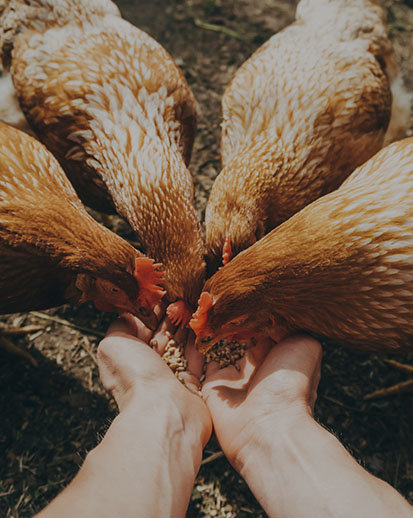Cross-cutting initiatives
World Economic Forum (WEF)
We are a strategic partner of WEF. We actively participated in both its virtual and in-person events throughout 2022, including the Annual Meeting in May. In 2022, our Co-CEO Dimitri de Vreeze represented DSM in the International Business Council (IBC). He also remained a member of the Steering Committee of the Chemical Governors. Our Co-CEO, Geraldine Matchett, remained a member of the Steering Committee of the Consumer Governors and the Food Security Stewards. Both spoke at various virtual events of the Forum.
We actively contributed to several initiatives in 2022, including the Alliance of CEO Climate Leaders, the CEO Action Group for the European Green Deal, the Food Innovation Hub Europe, and we participated in a number of meetings with public figures organized by WEF.
The SDG Tent
With the return of the Annual Meeting in May 2022, which had not been held in 2021 due to the COVID-19 pandemic, we once again joined forces with partners including Salesforce, Procter & Gamble, Rabobank and Yara for the SDG Tent, a venue for discussing business engagement for achieving the SDGs. Several successful events were hosted in the SDG Tent on topics such as food systems, climate action, circular economy and sustainable consumer choices.
World Business Council for Sustainable Development (WBCSD)
We are a member of WBCSD and participate in various working groups and coalitions. Ms. Matchett is a member of WBCSD’s Executive Committee and is a Commissioner in WBCSD’s Business Commission to Tackle Inequality (BCTI).
Food & Agriculture Pathway
Our Vice President Sustainability is a Board Member of the Food & Agriculture Pathway and a founding member of the Food Reform for Sustainability and Health (FReSH) project, with the aim to reorient food systems in support of improved population health on a healthy planet. In 2022, the WBCSD and nine leading member companies, including ourselves, published the paper ‘Food Affordability’, which outlined the roles that the food industry can play in providing affordable, nutritious food that supports healthy and sustainable diets. The paper mentions our good practices of fortified staples. Toward the end of the year, a series of ‘Processed Food Dialogues’ was organized by WBCSD with industry, NGO and academic stakeholders to discuss the role of the processing of food in providing sustainable and nutritious food while reducing food waste.
In 2022, we also took part in developing the Taskforce on Climate-related Financial Disclosures (TCFD) Climate Scenario Tool for Food, Agriculture and Forest Products providing a set of sector-relevant transition scenarios. We also helped launch an initiative entitled “Putting food on the table at COP27 and beyond” to mobilize action across public and private sectors.
Redefining Value
Redefining Value is WBCSD’s program supporting external disclosure and decision-making. In 2022, we participated in several workstreams, including the CFO Network. We supported a number of WBCSD consultations on topics including the International Sustainability Standards Board (ISSB) exposure drafts and the Impact weighted accounts consultation. We endorsed the joint statement developed by WBCSD, PRI (Principles for Responsible Investment) and IFAC (International Federation of Accountants) calling for increased alignment between standard-setters and supporting a global baseline for reporting sustainability-related information.
The European Chemical Industry Council (Cefic)
Cefic represents the voice of large, medium and small chemical companies across Europe. Mr. de Vreeze represented us until October 2022 in Cefic’s Executive Committee and Board and chaired Cefic’s Sustainability Forum, through which he focused on the acceleration of Cefic’s sustainability journeys. In 2022, we actively contributed to various workstreams of the Sustainability Forum, focusing amongst others on the development of indicators driving and monitoring the industry’s progress towards the SDGs in general and the EU Green Deal in particular and on developing guiding design principles for innovation that is safe and sustainable by design. Our experts are also member of various other internal Cefic groups and, for example, actively contributed to shaping Cefic’s view on the EU Sustainable Finance strategy.
Accounting for Sustainability (A4S)
A4S brings together leading CFOs to help embed the management of environmental and societal issues into business processes and strategy, particularly through the finance function. Ms. Matchett is a founding member of A4S and supports these objectives. In 2022, we participated in several virtual events and meetings, and we provided senior finance leaders with the opportunity to participate in the A4S Academy, a program which enables senior finance leaders to broaden their perspective on sustainability, the impact it has on business, and how companies can contribute.
Dutch Sustainable Growth Coalition (DSGC)
The DSGC is a CEO-led coalition of eight Dutch multinational corporations which aims to drive sustainable growth business models that combine economic profitability with environmental and social progress. The coalition of CEO’s uses their leadership for the development toward a future-proof world and sustainable growth. The DSGC stimulates activities and international cooperation, in value chains and between sectors, that contribute to the achievement of the SDGs. Every year the DSGC organises a meeting with the Dutch cabinet. In 2022, this meeting focussed on the energy transition, circular economy and international corporate responsibility. Moreover, the DSGC organised knowledge exchange sessions between company experts around, for example, innovation and technology. DSGC is supported by VNO-NCW and facilitated by Accenture.




